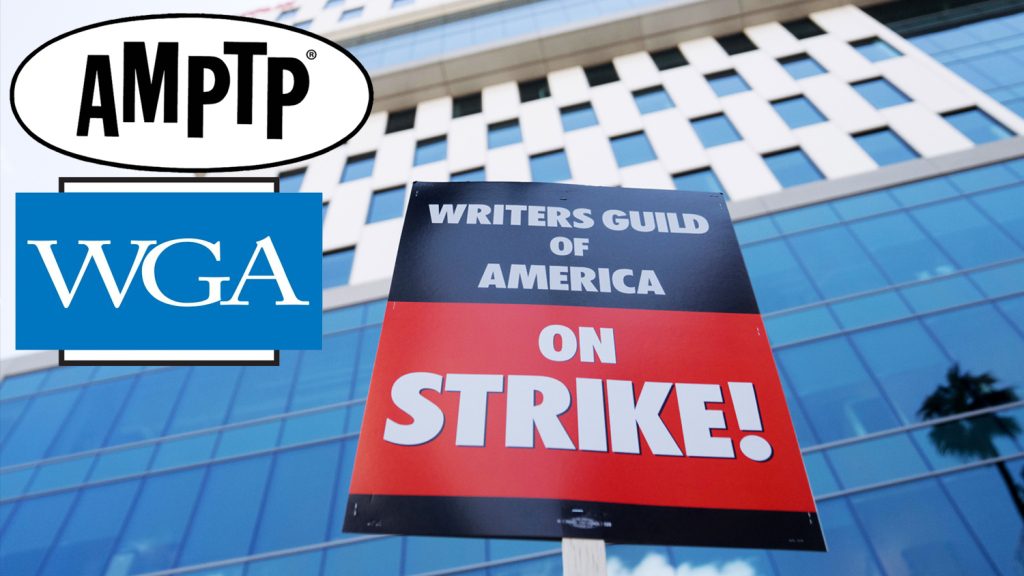Global Courant 2023-05-05 00:01:42
The Alliance of Motion Picture and Television Producers struck back today, providing answers to the WGA’s talking points about the failed negotiations that led to the ongoing writers strike, which is now in its third day.
“As we have said all along, our companies are committed to finding workable solutions to our ever-changing business for the mutual benefit of those who contribute to its success,” the AMPTP said in outlining its positions.
The group representing Hollywood’s studios says that its offer amounts to more than double the annual pay raises that the WGA claims was offered and that the guild’s demand for mandatory staffing amounts to “a hiring quota that is incompatible with the creative nature of our industry.”
A detailed list of the WGA’s specific goals is here.
This is the AMPTP’s first public pronouncement since talks broke off Monday night, when it said that it had “presented a comprehensive package” of proposals to the guild that included “generous increases in compensation for writers as well as improvements in streaming residuals.” It noted at that time that it is “prepared to improve that offer,” but is “unwilling to do so because of the magnitude of other proposals still on the table that the Guild continues to insist upon. The primary sticking points are ‘mandatory staffing,’ and ‘duration of employment’ — guild proposals that would require a company to staff a show with a certain number of writers for a specified period of time, whether needed or not.”
With today’s missive from the AMPTP, one WGA member who sat on the other side of the table in the now-shuttered negotiations says the studios are no monolith, and there are divisions between them. “I think there is going to be some interesting talks happening behind closed doors among the companies,” said WGA Negotiating Committee member Eric Heisserer today from the picket line outside Netflix HQ in Hollywood. “Right now, they don’t agree on everything. The longer this lasts, the more painful it’s going to get everybody on their side.”
Here are the AMPTP’s positions on the key issues:
Mandatory Staffing and Duration of Employment
The WGA’s set of demands includes proposals regarding mandatory staffing and guarantees of employment. These proposals require studios to staff a show with a certain number of writers who will be hired for a specified period of time that may not align with the creative process. If writing needs to be done, writers are hired, but these proposals require the employment of writers whether they’re needed for the creative
process or not. While the WGA has argued that the proposal is necessary to ‘preserve the writers’ room,’ it is in reality a hiring quota that is incompatible with the creative nature of our industry. We don’t agree with applying a one-size-fits-all solution to shows that are unique and different in their approach to creative staffing. Some writers are the sole voice of a show and others work with only a small team. The WGA’s
proposals would preclude that.
Overall Numbers
The WGA claims that the companies’ most recent offer on minimum wage increases adds up to approximately $41 million per year. Based on information available from the pension and health plans, the companies’ offer on minimum wages is closer to $97 million per year. And that doesn’t take into account the additional outsized wage increases and residual increases that the companies have offered.
Wage Increases
The first-year general wage increase currently on the table is the highest first-year increase offered to the WGA in more than 25 years. In addition, the companies have offered to create an entirely new category of rates that will establish a new and higher floor for mid-level writers’ compensation.
Streaming Residuals
In the most recent contract (2020), the WGA negotiated a 46% increase in residuals for streaming programs to take effect starting in 2022. In many cases, writers have only recently begun to see these increases in their paychecks. Under the current formula for a one-hour series produced for Netflix or Amazon Prime Video, a writer receives $72,000 in residuals for one episode over three years. Over five years, that amount grows to $99,000, and then to $114,000 over seven years. The companies’ most recent offer further improves on these amounts.
The WGA’s proposal on foreign streaming residuals represents a 200% increase over current rates and treats foreign subscribers the same as domestic subscribers. However, subscription fees vary from country to country, and in many countries, the subscription fee is substantially less than it is in the US. Nevertheless, the companies have recognized the importance of foreign streaming and have offered to increase the residual. These improvements apply to all types of streaming programs, including all feature-length streaming programs.
The “Gig Economy”
The WGA claims that companies are treating television writers’ jobs as if they were part of a “gig economy.” But employment as a writer has almost nothing in common with standard “gigs” jobs. For one thing, most television writers are employed on a weekly or episodic basis, with a guarantee of a specified number of weeks or episodes. It’s not uncommon for writers to be guaranteed “all episodes produced.” Plus, writing jobs
come with substantial fringe benefits that are far superior to what many full-time employees receive for working an entire year, including employer-paid health care, employer-paid contributions into a pension plan and eligibility for a paid parental leave program.
● Longer Employment: The WGA’s own published data shows that the median number of weeks of employment for a writer engaged on a streaming series is between 20 and 24. A staff writer engaged for 20-24 earns between $91,000 and $109,000 when paid at scale minimums . Writer-producers (the largest
category of television writers) earn between $150,000 and $180,000 when paid at scale for that period of time. These figures assume the writer is paid at scale, but frequently writers’ weekly fees regularly exceed these scale amounts. These figures also do not include residuals or any additional fees writers receive for
scripts. Currently, writers earn more than $28,000 for a half-hour script and more than $41,000 for a one-hour script.
● Benefits – Eligible writers participate in benefit plans that are the best in the industry.
● Pension Benefits: A writer only needs to earn $5,000 in a calendar year to qualify for pension benefits, and vests in the Pension Plan after earning only $5,000 per calendar year over five years.
● Health Benefits: Another important factor to consider is that a writer only needs to earn approximately $42,000 over the course of 4 calendar quarters to qualify for the WGA’s superior health insurance plan, which is free with no participant premium. To put it another way, a staff writer who works 8 weeks at the current weekly rate, or any other writer who works 5 weeks at the current weekly rate, will qualify for one year of free health coverage under the best health plan in the industry . (A writer will be able to qualify with even fewer weeks of employment under the companies’ most recent offer for outsized wage increases.)
● Paid Parental Leave Benefit: Any writer who qualifies for health benefits is also entitled to a paid parental leave benefit.
Artificial Intelligence
We’re creative companies and we value the work of creatives. The best stories are original, insightful and often come from people’s own experiences. AI raises hard, important creative and legal questions for everyone. For example, writers want to be able to use this technology as part of their creative process, without changing how credits are determined, which is complicated given that AI material cannot be copyrighted. So, it’s something that requires a lot more discussion, which we’ve committed to doing. Also, it’s important to note that the current WGA Agreement already defines a “writer” to exclude any “corporate or impersonal purveyor” of literary material, meaning that only a “person” can be considered a writer and enjoy the terms and conditions of the Basic Agreement. For example, AI-generated material would not be eligible for writing credit.
Script Fees for Staff Writers
The WGA makes light of the fact that the parties have a tentative agreement to pay staff writers script fees on top of their regular weekly compensation. This is a proposal that the WGA has pursued for decades. The companies’ agreement to the WGA’s proposal means that a staff writer who writes an episode of a one-hour series will be paid an additional $42,000, which is the equivalent of 8 weeks of pay at the weekly rate and, by
itself, enough to qualify for one year of health coverage and paid parental leave benefits.
Development Rooms
In response to the WGA’s concerns about development rooms, the companies agreed to introduce an entirely new payment structure for writers employed before a firm commitment has been made to produce a series. That offer included substantially increased minimum rates for those working in development rooms (from $10,798 to $11,554 per week in the first year of the agreement). In addition, the companies agreed to pay writers employed before a firm commitment has been made to produce the series a 15% premium on script fees and increase fees for a pilot script by 50% for high budget SVOD series.
Non-Dramatic Programs (Appendix A)
The companies’ offer to establish a minimum weekly rate for comedy-variety programs made for SVOD is unprecedented. The companies have never agreed to establish a minimum rate for this type of programming under any other collective bargaining agreement; the WGA would be the first.
The AMPTP said Monday night that it is “willing to engage in discussions with the WGA in an effort to break this logjam.” WGA leaders, however, scoffed at that claim after launching the strike on Tuesday, saying that the AMPTP had refused to bargain on many of the guild’s core issues.
Dominic Patten contributed to this report.








